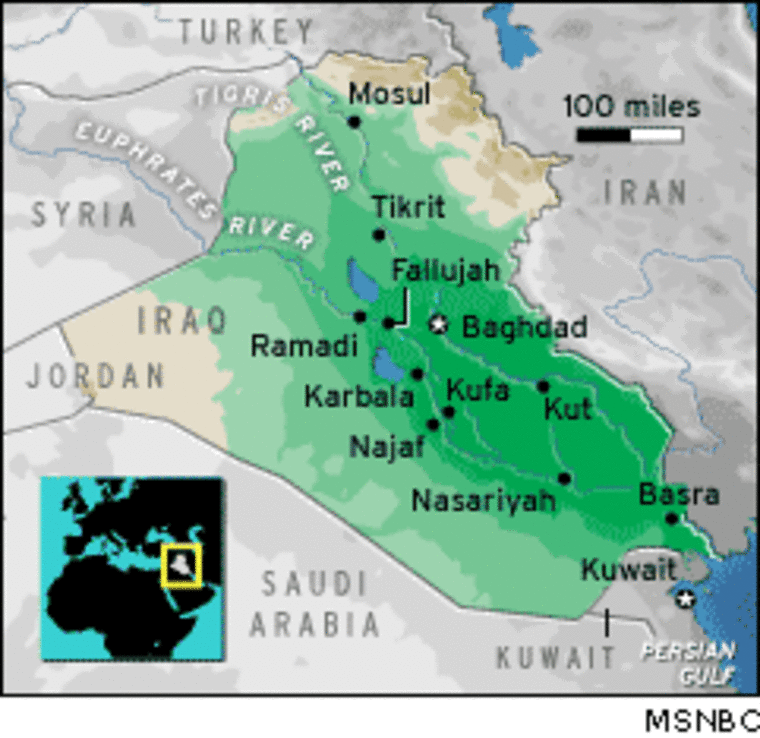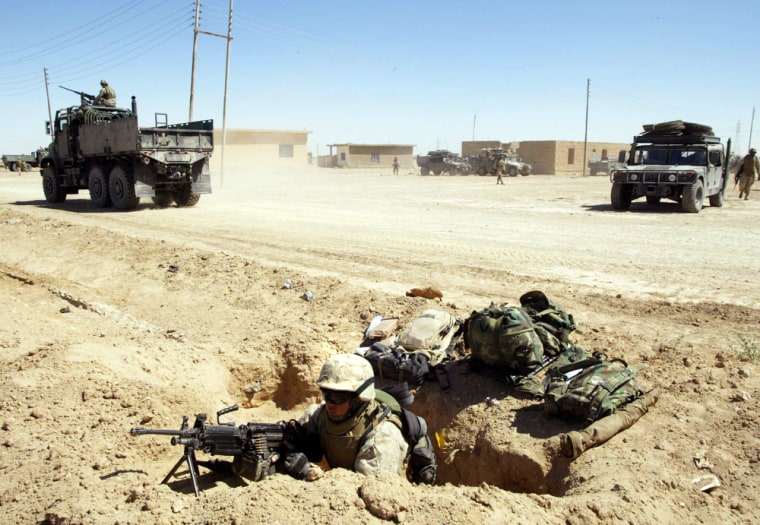In a narrow alley, U.S. Marines pinned down by a hail of guerrilla fire sent up red smoke in a cry for help. Tanks pounded shell after shell into houses, while troops on the edge of the city crawled forward on their bellies, firing on insurgents.
U.S. forces faced a tough urban battle Tuesday in their drive to “pacify” one of Iraq’s most dangerous cities. Block by block, they fought their way into Fallujah, where Iraqi guerrillas killed four U.S. civilians and a mob mutilated their bodies last week.
After nightfall, troops held a swath several blocks deep in one corner of the city of 200,000 people, Marine Maj. Briandon McGolwan said.
U.S. forces called out a weapon rarely used against the Iraqi guerrillas: the AC-130 gunship, a warplane that circles over a target, laying down a devastating barrage of heavy machine-gun fire.
Tuesday evening, U.S. planes firing rockets destroyed four houses in two neighborhoods, witnesses said. The strike killed 26 Iraqis, including women and children, and wounded 30 others, said Rafie al-Issawi, a doctor at Fallujah General Hospital, where the casualties were taken. The deaths brought the total number of Iraqi dead Tuesday to 34, according to the hospital’s count.
U.S. pushes deeper into city
During the day, U.S. forces made their deepest excursion since the siege of Fallujah began Monday. Troops in Humvees and on foot pushed into central neighborhoods, trading fire with gunmen, before pulling back from the farthest points before dark, witnesses said.
Marines from the 2nd Battalion, 1st Marine Regiment, entrenched in the desert just outside Fallujah, battled for hours Tuesday evening with insurgents firing from houses on northeastern edge of the city.
The battle began when a foot patrol that went a few blocks into the city came under fire from a house, said Cpl. Christopher Ebert of Forest City, N.C., who was on the patrol. He said two Marines were wounded.
Trapped in a narrow alley, unable to see the source of fire, the Marines put up red smoke to summon help, and a tank and an armored Humvee moved in. The tank battered the house with a heavy machine gun, and the patrol was extracted.
But soon afterward, guerrillas opened fire with rocket-propelled grenades and automatic weapons on the 2nd Battalion Marines just outside the city, sending the Americans diving into the sand and sparking a battle that lasted into the night.
Troops crawled on their bellies in the sand, firing and advancing across the swath of desert between them and the first line of buildings. From behind them, Abrams tanks pounded the neighborhood with shells, setting at least five houses on fire. Helicopters swirled overhead firing at any gunmen they saw.
‘Hit-and-run tactics’
Near the Americans, guerrilla mortars exploded, sending sand flying, and bullets whizzed over their heads.
“Insurgents usually fire and run. This time, they’re digging in, which is the first time we’ve seen them do that,” Ebert said.

Hundreds of Marines moved into the neighborhood, seizing buildings to use as positions against the insurgents and in some cases climbing to the rooftops. Some helicopters were hit with small arms, but they were not shot down.
The gunmen “use lots of hit-and-run tactics. They ambush a lot, and it is more tough for us to fight that way because we don’t want to injure civilians,” Marine Capt. Kyle Staddard said.
McGolwan said U.S. troops had captured 14 insurgents in the area since Monday.
Fallujah, 30 miles west of Baghdad, has long been a bastion of the Sunni Muslim guerrillas. Support for the insurgency is strong and hatred of the U.S.-led occupation is widespread, as evidenced by the cheering Iraqis who dragged the four Americans’ burned bodies through the streets a week ago.
On the outskirts of Fallujah, an Iraqi farmer just wanted to be able to reach his gardens, now in an area blocked by U.S. forces.
“The Americans, by coming here, have harmed us,” said the farmer, Ahmad Mashhan. “We are not armed people and we are not terrorists, but we are suffering from the siege.”
Asked how long it would take to seize the whole city, McGolwan replied: “As long as it takes.”
